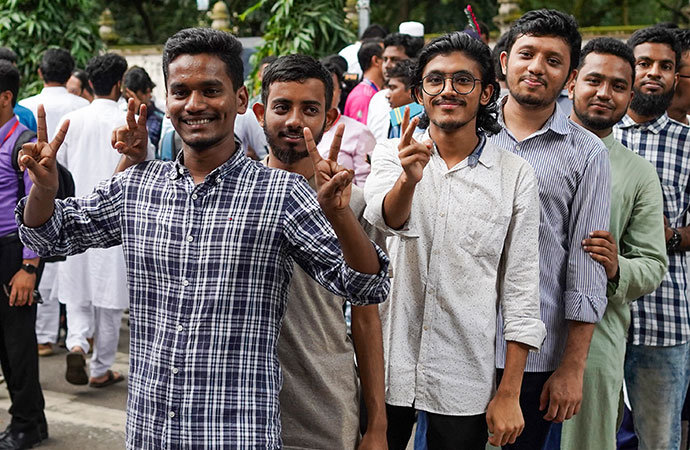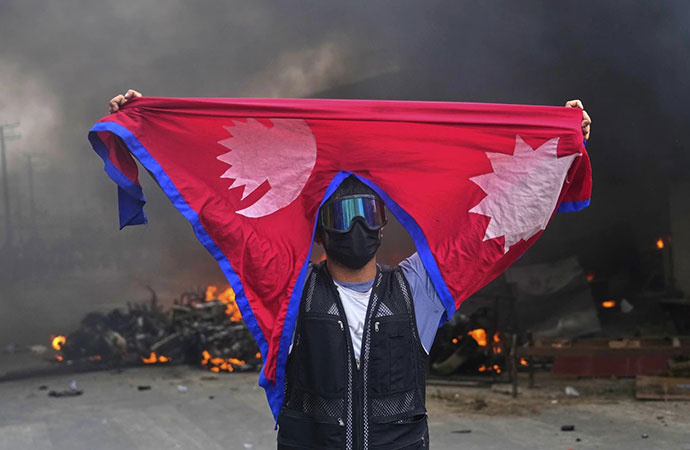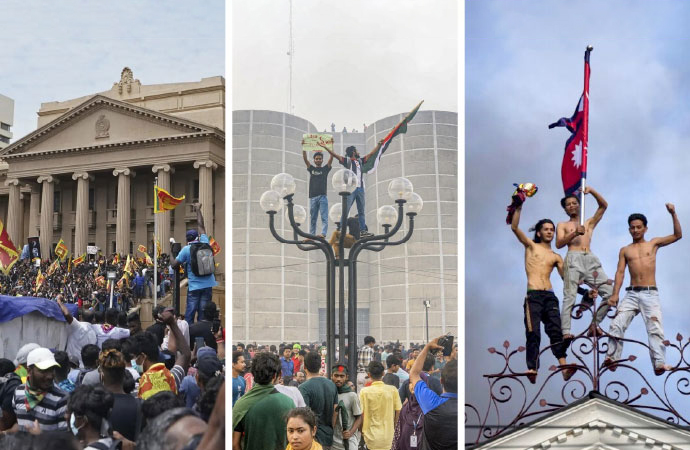Reportage

Photo: S A Hady/UNB
In a political earthquake that has been rumbling underneath the surface of post-Uprising Bangladesh, the Islami Chhatra Shibir-backed panel's candidates swept the first DUCSU elections in six years, with its candidate for the top post of Vice President, Shadik Kayem, winning his race in a landslide.
Out of the total 28 posts in DUCSU, the Jamaat e Islami student front-backed panel secured 23, in a stunning show of support within a student body that enjoys a reputation of being the most liberal in the country. The remaining posts were won by mostly independent candidates.
On the other hand, the panels backed by the BNP's student front, Jatiyatabadi Chhatra Dal, and the National Citizen Party-affiliated Ganatantrik Chhatra Sangsad failed to secure a single post.
Shadik Kayem was elected VP securing 14,042 votes, while his nearest rival Chhatra Dal's Abidul Islam Khan got 5,708 votes. The Shibir-backed panel's candidates for General Secretary and Assistant General Secretary, S.M. Farhad and Mohiuddin Khan respectively, also won comfortably.
In the General Secretary post, Shibir candidate S.M. Farhad was elected with 10,794 votes while his closest rival Tanvir Bari Hamim of Chhatra Dal was far behind on 5,283 votes. Meghmallar Basu of the Left Alliance-supported panel "Protirodh Parishad," in a very respectable showing, got 4,949 votes. Abu Bakar Majumdar of "Boishommobirodhi Shikkharthi Sangsad," as the GCS-backed panel got 2,131 votes, while another independent candidate Arafat Chowdhury got 4,044 votes.
In the Assistant General Secretary post, Shibir-backed candidate Md. Mohiuddin Khan was elected with 11,772 votes while his nearest rival Tanvir Al Hadi Mayed of Chhatra Dal, got 5,064 votes; Ashrefa Khatun of "Boishommobirodhi Shikkharthi Sangsad" secured 900 votes; independent candidate Tahmid Al Mudassir bagged 3,008 votes and Jabir Ahmed Jubel of "Protirodh Parishad" got 1,511 votes.
Another notable result was for the Liberation War and Democratic Movement Affairs Secretary, where Shibir-backed candidate was Fatema Tasnim Jhuma, originally of Sharif Osman Hadi's Inqilab Mancha. Jhuma stood out not only as a woman on the Shibir panel, one of four (who all won) - unlike the other three, who all belong to Shibir's women's wing, Jhuma doesn't observe purdah. For Shibir to have chosen her raised eyebrows, and she was endlessly harassed in the lead up to the vote. But she handled everything that came her way with unusual aplomb, and came out a winner, also ending up as one of the biggest vote-getters with 10,631 votes.
Voting was held Tuesday (September 9) in a festive atmosphere all across campus for the Dhaka University Central Students Union. Turnout clocked a dizzying 78.3% in the end, of the 39,000-strong electorate. Chief Returning Officer Professor Dr Md Jasim Uddin told reporters that voting in the DUCSU and hall union elections concluded with no major incidents reported throughout the day. Students cast their vote spontaneously and the overall atmosphere at polling centres was peaceful, he said.
That isn't to say it was all smooth going. Allegations of vote rigging and pre-filled ballots surfaced pretty early. Abidul Islam Khan of Chhatra Dal lodged formal complaints, while he himself was also accused (wrongly, as it turned out) of violating electoral rules by entering a polling centre. Polling agents reported obstructions. Chhatra Dal's senior leaders, including GS Nasiruddin Nasir and President Rakibul Islam, raised concerns about teachers' roles and alleged irregularities. Sporadic clashes and heated exchanges between Chhatra Dal and Chhatra Shibir supporters broke out at polling centres, requiring police intervention. All in all though, these were negligible and could not have influenced the result.
The entire campaign period was notably free of any violence or untoward incidents, except some instances of mostly online harassment. All in all, the DUCSU election was a win for post-Uprising Bangladesh. It was the first election of any note since last year's revolution, and it went about as cleanly as one could have hoped for. Irrespective of the result, what cannot be denied is that it was a Battle of Ideas, not muscle power. Even the much maligned and lamented 'bot attacks' are at least better than the primacy of physical violence we usually associate with politics in the country. The students of DU certainly have shown a better politics is possible. Now it is up to the rest of the country to pick up their thread.
Epic proportions
Reflecting on Shibir's unprecedented win, Professor Farid Uddin Ahmed of the Department of Political Science at DU said, "For more than 15 years, Chhatra Shibir has built an organisationally strong position inside Chhatra League, across various halls, faculties, and surrounding student hostels on campus. The organisation has maintained constant communication with its activists while also providing them with diverse career and technical training. The organisational skills, communication, and strategies of Shibir activists were far more efficient and effective compared to Chhatra Dal, the anti-discrimination student organisations, and the leftist student groups."
He said Shibir has worked at Dhaka University with long-term planning, functioning almost like a social movement. Its members pursue diverse studies, and their academic success is enviable, which attracts common students. Most of them behave well, and there are hardly any reports of extortion or violent activities against Shibir members. As a result, Chhatra Shibir has built a 'positive image' among students.
The duo at the top of the ticket, Shadik Kayem and S.M. Farhad, who rose to prominence during the July Uprising, read the mood of the campus perfectly. Especially the detachment they presented before students from their mother organisation, the unprecedented diversity in their panel, Chhatra Dal's tactical mistakes and failure to read the electorate's mood, and the secular vote getting divided among a wide number of candidates, stood them in good stead. They just ran a far more assured campaign than their rivals.
JCD's VP candidate Abidul Islam Khan and independent candidate for the same post Umama Fatema rejected the result alleging irregularities, despite the distance between themselves and winners being so large as to negate any possibility that any hanky-panky was involved in deciding the result.
Abid, and his senior leaders in JCD started complaining about irregularities in the counting process after voting was over, and in a Facebook post around 2:30am (the next morning), he wrote, "I guessed this result right after noon. Just put numbers as you like. I reject this staged drama."
In contrast, his panel's GS candidate, Sheikh Tanvir Bari Hamim, seemed to gracefully accept the result, even as he referred to some irregularities. In a status on his verified Facebook page around the same time as Abid, Hamim said: "If the students of Dhaka University think that this is their verdict, then I respect this verdict. I am waiting for the students' reaction."
Nagorik Oikya President Mahmudur Rahman Manna said students' strong stance against extortion, grabbing and dominance, along with their desire for new politics, helped Islami Chhatra Shibir panel win the DUCSU elections.
Speaking at a discussion on Wednesday, he also asserted that the DUCSU polls do not reflect the national vote and would not influence national politics. "This generation, after a year, feels that we do not want to see this criminalised politics, the lies, the extortion, the politics of capture and domination. They do not want to see such behaviour in politics. They want to do something new," he said.
Ganatantra Mancha organised the programme titled 'Democratic Transition in Bangladesh: The Path to Reform' at Dhaka Reporters' Unity (DRU). Manna, a former DUCSU Vice President, warned that if politics is only about lies, extortion and the struggle for power, it will not be sustainable.
Elaborating on the DUCSU polls' impact on national politics, he said, "I have been DUCSU Vice President twice. I was very popular among students, but I did not have a political party. I did not come to power, and my party could not come to power either. Winning in DUCSU does not mean they will achieve something huge in national politics."
Referring to Chhatra Shibir's previously unthinkable victory, Manna said, "Thirty or 40 years ago, some political parties could not openly participate and faced danger if anyone noticed them. Now, they are standing tall before us. Even big parties are being challenged."
Manna added that the DUCSU election has shown that fair voting is possible, even though many found the results hard to believe. He thanked the student community, saying they showed courage that previous generations could not. The Nagorik Oikya leader noted that independent candidates are now willing to run, signalling a shift.
"Politics is no longer about large rallies but about digital campaigns and the ideas of the new generation," Manna said. "This generation has rejected old traditions like greeting seniors, following rigid protocols, and domination politics. They understand that politics requires sincerity, struggle, and commitment, not shortcuts to power."
He said while political parties have become opportunistic, students have set a different example. "For fair elections in the future, unity and reforms are essential. For this, as much firmness is needed as flexibility when necessary."
Where does BNP go from here?
BNP Standing Committee member Salahuddin Ahmed congratulated the winners of the DUCSU elections the next day, although he appeared reluctant to give the full credit to Shibir.
"I would like to personally congratulate those who have won in the DUCSU elections, as this is the norm of democracy. Since the elections were held after many years, there were some flaws," he said while addressing the 47th founding anniversary of Jatiyatabadi Mohila Dal at the Institution of Diploma Engineers, Bangladesh.
Referring to media reports, Salahuddin said it was being reported that a Shibir-backed panel had won the DUCSU polls. "I want to tell my journalist friends that, to my knowledge, Bangladesh Islami Chhatra Shibir did not take part in this DUCSU election and no panel contested under its name or banner. Then why is it being reported this way in newspapers and other media? That is the question."
The BNP leader said their student wing Jatiyatabadi Chhatra Dal contested the DUCSU election under its own name and banner. He said other parties, including Islami Andolon Bangladesh, also took part under their names, while some groups contested as Independent Student Unity, Integrated Student Union, Students Against Discrimination Union, Unbeaten '71, and Undaunted '24.
He said those who chose not to contest under their own names must have had their own motives. "The panel that has won is 'Oikyoboddho Shikkharthi Jote'. I would once again like to personally congratulate those who were victorious under that banner."
Somewhat surprisingly, when asked to reflect on what the result portends for the national election in February, Salahuddin said student union elections like DUCSU have always influenced national politics. Recalling his own student days in the late 1970s and 1980s, the BNP leader said he had seen many leaders rise through these platforms, some reaching Parliament while others faded away.
He said Bangladesh's major political and social changes had come through student politics, and universities must remain centres of political practice as national leadership grows from there.
"Those who are against student politics or call for its abolition - I stand against them. Because the practice of politics is part of education; the university is its classroom. From there, leadership for national politics emerges through continuous development," the BNP leader said.
Salahuddin said political learning should begin with student politics, but not the kind of politics seen during fascist regimes. He called for a politics based on accountability, good governance, equality, morality and human dignity, urging all to struggle for such a political culture and state system.
More widely within the party, leaders tend to see their own weaknesses reflected in the result, but are also willing to give credit to their opponents. They believe that Chhatra Shibir contested the election with adequate preparation, while Chhatra Dal fell short in that regard.
Professor Mosleh Uddin Ahmed, who teaches public administration at DU, said: "Chhatra Dal's message did not reach the students properly. This is because the organisation's members had not been on Dhaka University campus for a long time due to the harassment and oppression by Chhatra League. They were only able to work with a very limited number of students from outside."
Mushtaq Hossain, who served as DUCSU's general secretary for the 1989-90 session, pointed to the sea-change in the electorate, that is now commanding a new kind of politics on the same DU campus where the War of Liberation kicked off with the launch of the Pakistan Army's Operation Searchlight in 1971.
"Since independence, the student community has turned away from the political forces that have governed the country," said Mushtaq. "The students have become so disillusioned that they even wanted to give a leadership opportunity to a religion-based, anti-liberation organisation like Chhatra Shibir. Moreover, in the past, the oppressive and abusive actions of the Awami-aligned Chhatra League on campus, carried out in the name of the Liberation War, not only made common students view the organisation with disdain but also rendered the ideals of the Liberation War ineffective."
It all points to a new reality prevailing on campuses, that Shibir was able to recognise and adapt with deftness and intelligence. If those are the determining factors in the politics of Bangladesh 2.0, that is a qualitative change we can always welcome.

























Leave a Comment
Recent Posts
Religion and Politics: A Toxic ...
At Dhaka University, cafeteria workers have been told not to wear shor ...
Enayetullah Khan joins AsiaNet ...
AsiaNet’s annual board meeting and forum was held in Singapore, ...
In a New York minute
Many leaders back a UN call to address challenges to ..
Defaulted loans at Non-Bank Financial Institutions ( ..
How the late Zubeen Garg embodied cultural affinitie ..